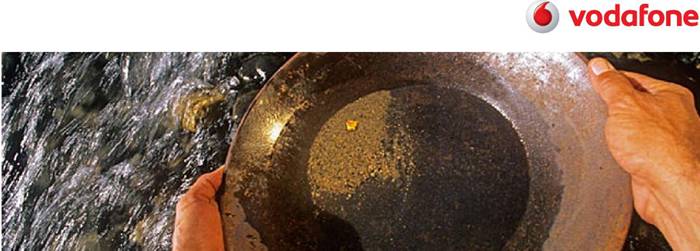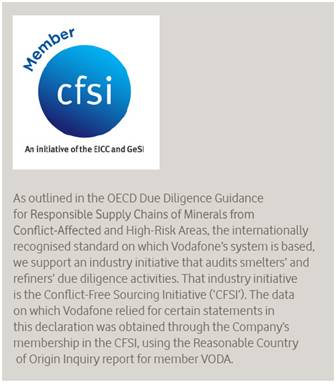Introduction This Conflict Minerals Report for the year ended 31 December 2014 is presented by Vodafone Group Plc (‘Vodafone’ or ‘the Company’) in accordance with Rule 13p-1 (the ‘Rule’) under the U.S. Securities Exchange Act of 1934 (the ‘Exchange Act’). The Rule applies to companies required to file reports with the U.S. Securities and Exchange Commission (the ‘SEC’) under Section 13(a) or 15(d) of the Exchange Act if any of the products they manufacture or contract to manufacture contain conflict minerals necessary to the functionality or production of the product (‘in-scope products’). As defined by the content requirements of SEC Form SD, ‘conflict minerals’ include cassiterite, columbite-tantalite (coltan), wolframite and gold, and the metals derived from these minerals – tin, tantalum, tungsten and gold respectively (each a ‘3TG’ metal). Please refer to the requirements of SEC Form SD (available at www.sec.gov/about/forms/formsd.pdf) for definitions of many of the terms used in this report, including ‘covered countries’ (Democratic Republic of the Congo (‘DRC’) or an adjoining country). Company overview Vodafone is one of the world’s largest telecommunications companies and provides a range of services including voice, messaging, data and fixed communications. Vodafone has mobile operations in 26 countries, partners with mobile networks in 55 more and fixed broadband operations in 17 markets. As of 31 March 2015, Vodafone had 446 million mobile customers and 12.1 million fixed broadband customers. Vodafone generated revenues of £42.2 billion in the financial year ended 31 March 2015. Vodafone’s American Depositary Shares are listed on the NASDAQ Stock Market LLC (‘NASDAQ’). Vodafone is subject to the NASDAQ listing rules and files reports with the SEC under Section 13(a) of the Exchange Act. Vodafone uses electronic equipment in its operations and sells products, such as mobile phones, tablets and other devices, to its customers. Vodafone does not manufacture these products itself, but does purchase them from suppliers and, in some | cases, contracts to manufacture products that it sells to customers. A product that Vodafone contracts to manufacture is one where Vodafone specifies terms that give the Company a limited degree of influence over the manufacturing of the product, such as certain aspects of the materials, parts or components to be included in the product. Of the billions of euros Vodafone spends each year with thousands of suppliers, products identified as in-scope (see Applicability below) only account for a small proportion of the Company’s total expenditure. Electronic products contain numerous components that may contain one or more of the 3TG metals. These metals come from many different smelters and refiners. Both the smelters and refiners, and the mines from which minerals are originally sourced, are several steps away from Vodafone in the supply chain. Applicability Vodafone conducted an analysis of procurement spend to identify (i) product-related spend categories likely to include products that contain 3TG metals and (ii) whether such products were likely to be ones that Vodafone contracts to manufacture and are therefore covered by the Rule (‘in-scope products’). Through this analysis, Vodafone identified three types of product-related spend categories which it considered likely to include in-scope products: (i) selected handsets; (ii) connected home devices (i.e. routers, modems, and femtocells); and (iii) datacards (i.e. mobile broadband dongles). Vodafone then analysed individual purchase orders within these product groups to identify which were likely to include in-scope products. Taking a risk-based approach, this analysis focused on purchase orders above a certain value, below which it is extremely unlikely that Vodafone would contract a supplier to manufacture products. Through this applicability assessment, Vodafone identified 30 in-scope products (including handsets, mobile broadband dongles, set-top boxes, femtocells and machine-to-machine (‘M2M’) tracker devices) that were purchased or technically accepted (the point at which Vodafone operating companies |

